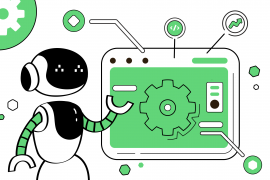What seems like a perfectly natural and legitimate question for a potential customer is a nightmare for any vendor it is addressed to. How do you even roughly quote for something as complex as a customer relationship management system on the go?
After all, when it comes to computer systems that are even slightly more sophisticated than a website with a dozen static pages, estimates tend to get exponentially fuzzier with every new component thrown into the mix. In the end, it becomes apparent that an acceptably accurate cost breakdown can be produced only after a separate phase of business analysis conducted in tight cooperation with the customer.
Development of custom CRM solutions is one of the core competencies of Rubyroid Labs. We have delivered quite a few custom CRMs, and some of them, like the fairly recent Rocketwash CRM (www.rocketwash.me), are really getting some traction on the market.
You can probably imagine that we get asked about custom CRM costs quite a lot, so we thought it would be useful to summarize some of our ideas in an article. The text below is based solely on our experience and understanding of the purpose, architecture, and best practices of building well thought-out, functional, and truly convenient tools for your business.
Contents
-
- Types of CRM Software
- Business analysis
- Design
- CRM theme approximate cost
- Registration and sign-in
- Admin Tools
- Custom Business Flows
- Statistics and reporting
- API integrations
- Media Services
- Testing
- Is Custom CRM Cost Worth It?
- How You Can Reduce the Custom CRM Development Cost
- Bottom line — Custom CRM Development Cost
So, let’s cut to the chase and dissect the cost of building custom CRM software and find out what components and activities it includes. But before that, we’ll figure out the existing classification of CRM.
Types of CRM Software
When it comes to developing a CRM system, every business has its own unique requirements, including customer support, marketing, and sales instruments.
CRM solutions come in three main categories: operational, analytical, and collaborative. Each type addresses specific aspects of customer relationship management, from automating sales and marketing tasks to analyzing customer trends and facilitating collaborative efforts.
Collaborative CRM
Collaborative CRM, also known as strategic CRM, is used to centralize customer data for easy access by marketing, sales, and service teams. This comprehensive view of customer communications, purchase history, service requests, and other relevant details provides service representatives with the information needed for effective problem-solving. Collaborative CRMs can also automate responses based on this data, streamlining the service process.
Key aspects of this CRM include interaction management and channel management. Interaction management records all customer interactions across various channels (email, social media, etc.), while channel management uses these insights to choose the best communication medium for each customer.
Operational CRM
Operational CRM tackles the repetitive tasks that sales, marketing, and customer service teams often find mundane. By automating these tasks, staff can focus on their strengths and enjoy their work more.
In sales and marketing, operational CRM handles prospect tracking, sales forecasting, and marketing campaign management. This automation lets sales teams build deeper customer relationships and marketers tailor messages to specific audiences.
Analytical CRM
This CRM collects and analyzes customer data from various sources, revealing patterns and trends. These insights help businesses understand customer behavior and preferences.
The data aids in lead generation, targeted marketing campaigns, and improved customer service. Analytical CRMs are also valuable for pipeline analysis, sales forecasting, budgeting, and reporting.
Often, businesses benefit from a combination of CRM types. For instance, insights from an analytical CRM can enhance the effectiveness of an operational CRM. The ideal CRM solution depends on your specific goals and objectives.
Business analysis
We’ve already mentioned that a properly executed business analysis stage is an essential prerequisite for producing a meaningful estimate of any software project, including a CRM system. The most typical artifact delivered at this stage is a functional specification — a detailed document approved by the customer and containing a complete description of the functionality of the future product. Once approved, it is used for estimating the cost of the project and planning production activities.
Bear in mind, though, that the importance of a good functional specification is even higher in the case of a personalized CRM system, as it usually features a large number of custom components and elements, customer-specific business flows, and other non-standard pieces of functionality that need to be developed from scratch.
Approximate cost: based on our experience, the creation of a functional specification of an average complexity costs around $5,000.
Design
Some would argue that design may not be as important for a CRM system as it is for a flashy landing page or a sleek corporate portal. They may have a point, but it’s definitely something that you can’t do without — after all, your corporate CRM tool should look just as professional as the rest of your software suite.
The most cost-effective way is to purchase a professional theme from an online theme store like https://themeforest.net/. Prices for good themes will range from a couple of hundred dollars to around a thousand for the best ones, potentially with exclusive ownership to ensure design uniqueness. The greatest thing about a ready-made theme is that it really saves your time and money, which is crucial for MVP projects.
However, if your vision of a perfect CRM implies deeper customization, branding, and a one-of-a-kind look and feel, you may want to opt for a fully tailored design. It would have to cover everything — from the sign-in page and pop-up onboarding tutorial windows to dozens of control elements, graphs, dashboards, and much more. As you can imagine, custom CRM pricing involves paying for a lot of original design and coding work.
The implementation time in both cases will vary significantly depending on the number of pages the design will need to be applied to, and the number of target platforms and resolutions to be supported.
CRM theme approximate cost
Registration and sign-in
The registration screen is the first thing that your users see, and the ease of the sign-in process will largely define their first impression.
If you are working on an MVP version of your CRM software system, you may want to save time and go with the conventional registration process involving email confirmation. A live version of a standalone CRM would probably require authentication through social networks (OAuth).
Finally, if you are planning to weave the new CRM system into your corporate infrastructure and make it a part of your standard software suite, you should consider adding SSO (Single Sign-On) capabilities to it. SSO enables you to use the same credentials for signing into any of your software systems. Once you sign in, you can go to any of the sites and systems under the SSO umbrella without having to repeat the procedure. This functionality can be implemented using different methods depending on your security requirements, your network configuration, and other factors.
Approximate cost: $1000 – $2000 for the basic sign-in/password recovery option; $1000 – $2000 for OAuth authentication per channel (Facebook, Google, etc.); $2000 – $5000 for integrating with an enterprise SSO server; $5000+ for deploying a standalone SSO server.
Admin tools
Any online service or website that has users requires corresponding tools to manage them. The complexity of these tools can be very different: from basic create-rename-update-delete operations to comprehensive site content and user management mechanisms involving group- or role-based policies, configurable access permissions, and advanced user-level statistics.

As a result, the cost of developing such admin tools may also vary in a very broad range. The minimal set of CRUD operations suitable for an MVP version coupled with equally basiс statistics will cost around $3,000 – $5,000, whereas a more advanced set of system administration tools tailored to the customer’s specific needs and wants may cost over $10,000 alone.
Approximate cost:
Custom business flows
This part accounts for the biggest chunk of your CRM development service costs. These are your business processes, your sales funnel, your deal nurturing strategies, everything. They will be embodied in dozens or even hundreds of interconnected screens that help your business and employees stay effective, retain existing customers and win new ones, meet operational goals, process feedback in a timely manner, and interact with the audience in a completely new way.
Being the largest part of any CRM system, it is also the hardest one to estimate without having a functional specification at hand. Without one, it’s nearly impossible to correctly assess the complexity and quantity of dependencies between the various flows and their parts, so the estimation process occasionally borders on educated guesswork. As a rule, the developer multiplies the projected page count by a certain average page cost to produce an estimate.
The approximate number of custom pages can be derived from similar solutions from the vendor’s portfolio or high-level data flow diagrams that can be produced as part of the pre-sales.
Approximate cost: expect each custom page with the underlying business logic to cost around $1,000 in development. Expect to have dozens to hundreds of pages if you are serious about the functionality of your future CRM.
Statistics and reporting
What’s the point of collecting data if you can’t make use of it? Statistics and multi-level reporting are key to understanding your current standing with customers, your pipeline, and business dynamics. A good CRM system offers a slew of reporting tools that allow you to generate complex reports and analyze data by comparing different data sets, identifying emerging trends and detecting bottlenecks.
Reports can be presented in different ways: from plain tables to complex visualizations involving advanced libraries like D3.js. You can take your reporting even further by feeding your data to external services for a whole new level of data analysis.

When it comes to the cost of CRM, a data report of average complexity will amount to around $2,000, while full integration with a third-party data analysis or visualization service is likely to be in the ballpark of $5,000 or even higher, depending on the nuances of the chosen integration scenario.
Approximate cost:
API integrations
Siloed applications are not exactly the hottest trend these days. With so much data residing in your CRM and so many useful services available on the market, staying in isolation is simply unwise. The list of systems you can integrate with is virtually limitless:
- VoIP and call automation systems
- Brand monitoring tools
- Business directories
- Calendars
- Email marketing systems
- Social networks
- Customer support systems, etc.
Integrating your CRM with the best tools on the market is a great way of dramatically expanding its functionality and unlocking new ways of interacting with your customers.
Approximate cost: simple and straightforward integrations can cost as little as $1,000, whereas more complex ones (external data sources, other CRM or ERP systems, call automation platforms) are likely to be in the $5,000 – $10,000 range. Finally, if you need to hook your CRM to a complex and secure enterprise system (in banking, insurance, or financial services) with advanced authentication and non-trivial data mapping, expect a price of $10,000+ per integration.
Media services
Your CRM app is not supposed to be all text-based and static. If you are in the media business, it may have various media objects accessible from within the user interface yet physically stored in the cloud. Or it may have built-in direct video calls utilizing the WebRTC technology for convenient browser-based calls.
Whatever your business is, you can definitely take advantage of the hottest cloud platforms, Azure and AWS, and leverage a plethora of mind-blowing services that they offer: from AI-powered image and voice recognition, real-time media encoding, and unlimited cloud storage to advanced analytics and customer engagement tools.
Approximate cost: the complexity of such integrations can vary hugely, but expect a basic cloud storage for your data to set you back by $2,000, P2P video calls — by around $5,000, and more complex services to be even more expensive.
Testing
Typically, testing is not included on a separate line in the bill but rather spreads evenly on top of all development tasks. Few would question the importance of thorough testing and QA on such a business-critical project, and they would be wrong. Quality assurance accounts for around 30% of the overall quote, with 10% being allocated to manual testing and 20% to test automation, regression, and integration testing.
Is Custom CRM Cost Worth It?
As you can see, the custom CRM pricing may exceed several thousand dollars. But having a product like that may also bring in benefits well above dollars spent. Therefore, you should think carefully before you choose custom development.
The key situations when you need to build a custom CRM are as follows:
- You want to sell your CRM to other businesses.
- You draw on a unique organizational concept.
- Your business situation keeps changing.
To better understand whether you need to go custom or not, use this CRM pre-building checklist.
How You Can Reduce the Custom CRM Development Cost
Calculations in this article are approximate. The actual cost of tailored CRM will depend on several parties and factors. The good news is you can reduce the cost by understanding those factors. Here are a few tips.
Start with an MVP
No need to go full force from day one. Many of the bells and whistles you have in mind may wait until you know which problems your CRM should solve for users.
So, if you are building a customer product, start with an MVP. Narrow down one or two killer features that set your prospective CRM apart from the rest. This will help you test the idea against the market and refine your vision before you potentially waste tons of money.
The same refers to building a corporate product. Build a CRM around your killer feature or features and try them out as part of your workflow. In the process, you may realize that a particular feature is not so crucial after all, considering its price tag for custom development.
Don’t Go with the Cheapest Bidder
There are lots of outsourcing companies that will readily offer developer hourly rates below $25 per hour. But this is a trap. The lower the price, the higher is the chance you will have to completely rebuild your application.
Self-Preparation
Finally, the best way to make your budget work is by taking time to prepare for the development properly. You will need to present your application idea to the developer as clearly as possible. This will help them avoid getting off track and spending time you are paying for building the wrong product.
Bottom line — Custom CRM Development Cost
There can be no definitive answer to the question “How much does it cost to build a CRM?” Answering this question requires time and certain efforts on both sides. However, the average cost of a fully-custom CRM is likely to start in the $100,000 – 150,000 range, with the top of the cost bracket being fully contingent on the specifics of your business and the features that you want to empower your employees with.
One thing is clear, though — you will need a professional to lay it all out the right way and build it. The Rubyroid Labs development team has done it for customers from a number of industries and has earned the reputation of a CRM professional. We’ll be happy to share our experience and help your company create a unique tool that is perfectly adapted to your business.
Rubyroid Labs is the custom CRM development company. Learn more about our services.












8 Comments
When do I need to develop a custom ruby on rails CRM, and when use ready tools?
It depends on your business needs. Check this post. It should help https://rubyroidlabs.com/blog/2020/01/before-building-a-crm-go-over-this-checklist/
How much will mobile CRM cost?
To tell you the cost, we need more details: features, technologies, etc. To get estimation from Rubyroid Labs, contact us via [email protected]
The post is interesting, but how much are CRM developer rates?
Thanks for the positive review. To get the rate cards, email us at [email protected]
how much money do I need to build a crm system from scratch?
We'll calculate the exact cost and budget for you if you send a description of your project at [email protected]